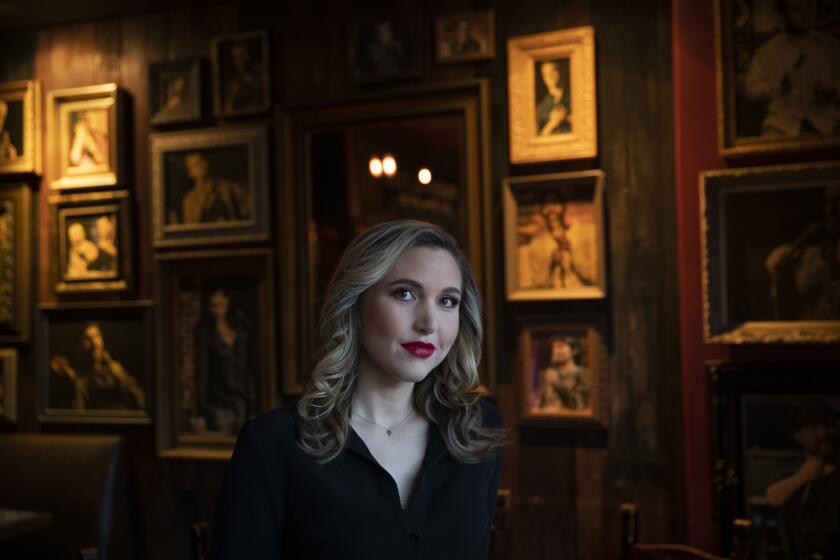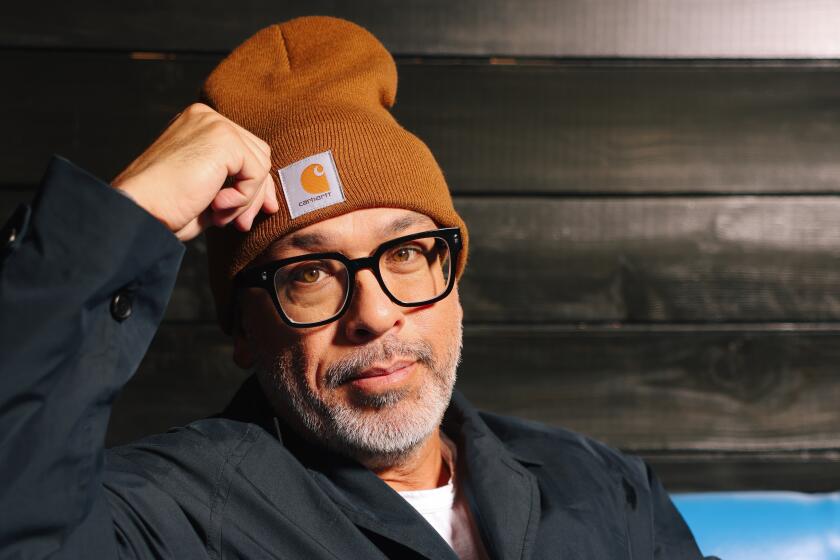From stand-up to late night, Taylor Tomlinson finds a way to ‘have it all’ on her own terms
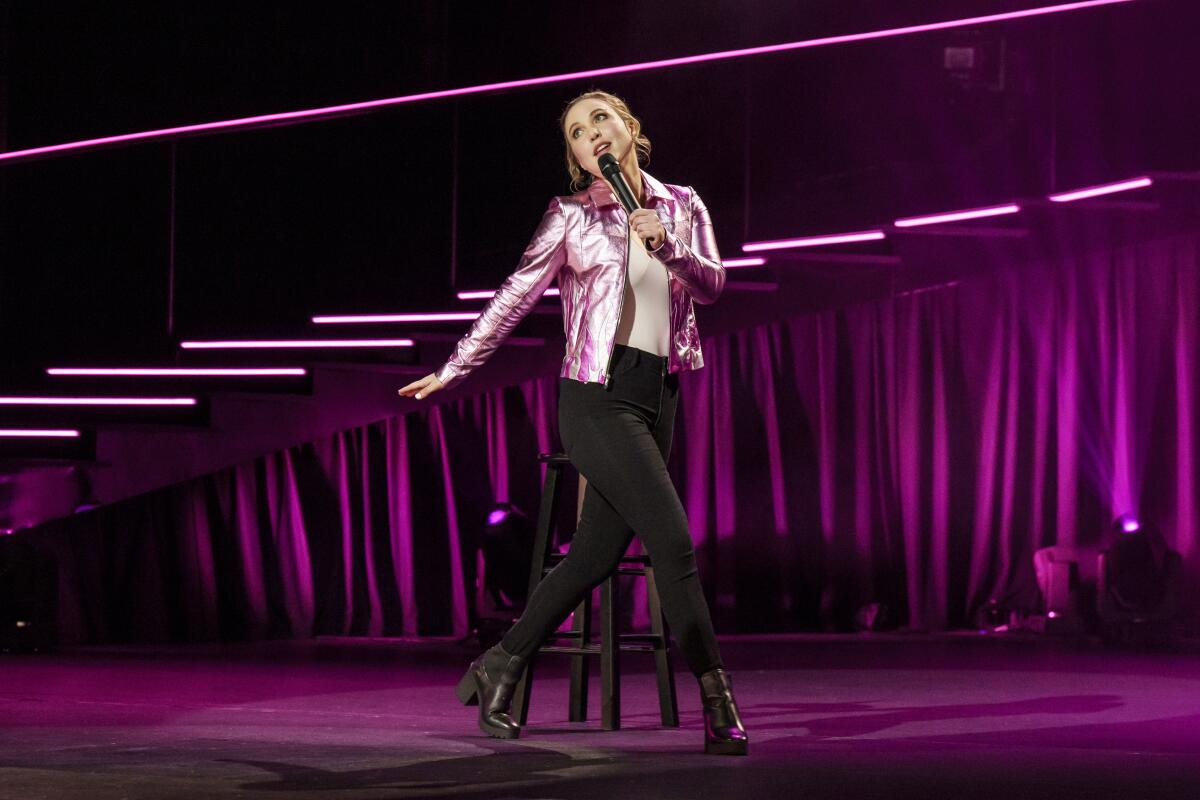
- Share via
This is the first day Taylor Tomlinson has had off in a month. Though it’s unclear what “off” means, exactly. We still have this interview scheduled, and later in the day, the comedian and newly crowned late-night host is getting ready to drive down to Palm Springs for her best friend’s bachelorette party. “Not really off — just a different kind of on,” Tomlinson cracks.
Though Tomlinson, 30, has been having whirlwind years since the release of her first Netflix special, 2020’s “Quarter-Life Crisis,” so far 2024 has become a full-on cyclone. Recently she kicked off a late-night gig hosting CBS’ comedy-panel show “After Midnight” (a revival of Comedy Central’s “@midnight”), and on Tuesday she’ll unveil her third Netflix special, “Have It All.”
The title is a winky-face, tongue-out emoji referencing the once-proselytized second-wave feminism trope that promised successful women (like Tomlinson) an upwardly mobile career, stable marriage, and (likely) children. And despite all that juggling, none of these things should have to fall by the wayside. In the special and preceding stand-up tour, Tomlinson isn’t necessarily asserting that having it all is impossible; she is more suggesting that “it all” won’t look anything like you thought it would when you were younger. Growing up in a conservative Methodist family in Temecula, Tomlinson got her start performing Christian comedy as a teenager. In her 20s, her material became decidedly less wholesome and the gigs higher profile, including spots on “The Tonight Show,” “Conan” and the Just for Laughs Festival. “I still believe in God,” she joked on “Conan” in 2017. “I think because I invested so much time into the idea. Because if there’s no God, then I told the wind a lot of secrets.”
We called up Tomlinson on her ostensible “day off” to talk about “After Midnight,” weird sleep advice, her favorite comfort shows and what it really means to “have it all.”
How was it attending the Emmys and presenting with Stephen Colbert? I know you must be used to performing in front of huge audiences, but I can imagine that the Emmys auditorium would be a new, potentially intimidating experience, even for a seasoned performer.
Oh, yeah. I mean, look, normally when I’m speaking to a larger room of people, they aren’t all movie and TV stars. So that was a little different, as you can imagine. It was surreal. [“After Midnight”] was premiering the next day, and we had been doing test shows leading up to it. I was in the middle of editing my special, so it was a lot. I don’t even know if I had enough time to process.
But it was really fun to present with Colbert. He’s so kind. He’s been doing this for so long. I thought it was really generous of him to present with me [and for him to] come to rehearsal to make sure I felt comfortable.
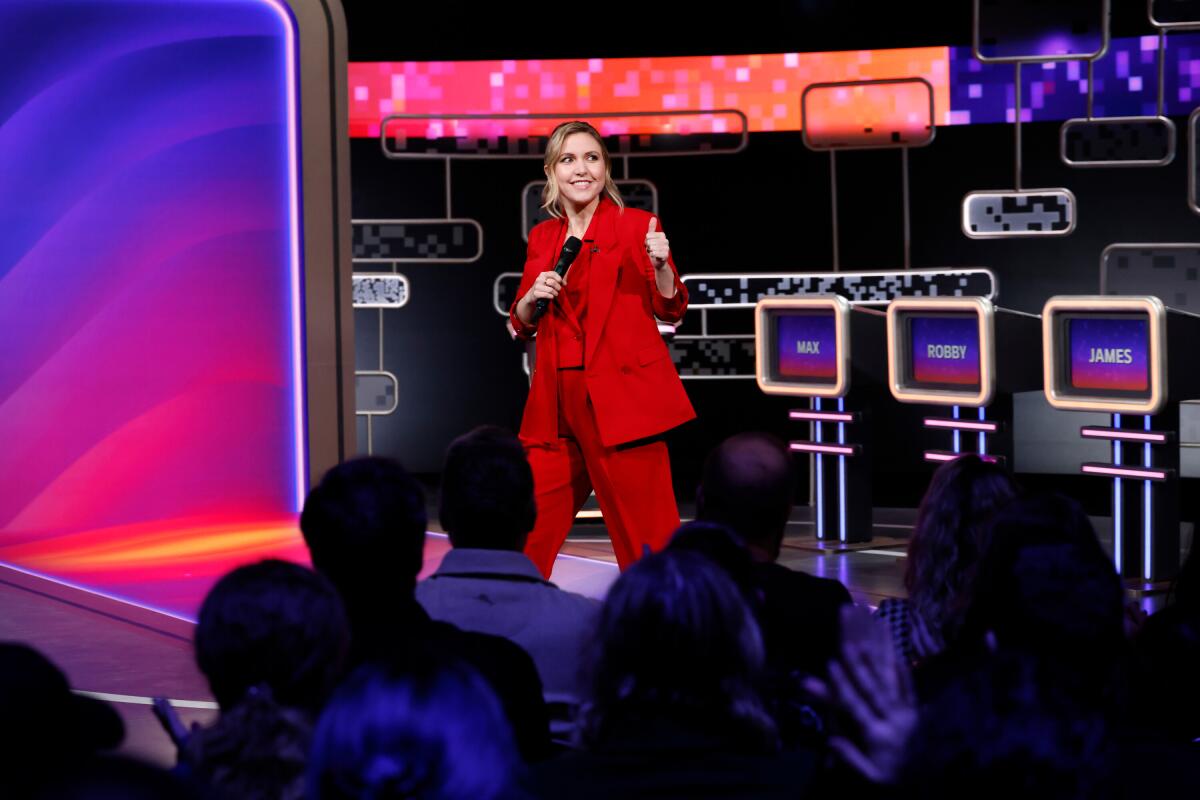
You toured with Conan in 2019. Bearing in mind that Conan and Colbert’s late-night talk shows are quite a different format, did they have any words of wisdom as you kick off this new era of your comedy career?
Yeah, “After Midnight” is not a traditional late-night talk show, which some people online are very surprised by. I think some people read headlines, see “late night,” and assume it’s a talk show. Obviously, our format is so different. I think some of the best advice Colbert has given me is, “Have fun, because if you’re enjoying yourself, the audience will enjoy themselves.” Luckily, I genuinely am [having fun]. I wouldn’t have taken this job if I didn’t [think it] would be fun. Joe Farrell, one of our producers, was like, “We’re gonna have OK shows, we’re gonna have amazing shows, we’re gonna have weird shows.” The important thing to remember is — and Colbert said this too — if it goes well tonight, amazing. You still gotta come in tomorrow and do it all again. If it goes poorly, who cares, you’re gonna come in tomorrow and do it all again. Which, for somebody who is used to honing an hour of material over the course of a year and a half, it’s a new experience for me.
“After Midnight”’s format reminds me of watching British panel shows, like “Never Mind the Buzzcocks.” Was that part of the intention?
Totally. [Comedy Central’s] “@midnight” was a big inspiration for it, because obviously this show is a reimagining of “@midnight.” I didn’t create [“After Midnight”], but as far as I can tell, that is a big part of the intention. We’ve [already] got, what, four talk shows? It’s fun that it’s a different thing, at least here in the states.
How were you initially approached?
I interviewed with [CBS] in early fall. It was pretty fast. They had known they were going to be in that time slot early in the year. I took the meeting because I thought I’d love to be a guest. But I obviously wouldn’t be able to do that [hosting] schedule because I was sure it’s Monday through Friday. My manager was like, “I’ve heard that it might not be that way.” And I was like, “OK, well, let’s see.” [CBS said], “We shoot Monday through Wednesday, and it’s so we could have a stand-up [comedian]. Like, [‘@midnight’ host] Chris Hardwick was a stand-up. This is a job you could do and still tour on the weekends.” I wasn’t immediately sure I wanted the job. I went into that meeting going, “I’m not gonna be able to do this.” So, to find out mid-meeting, I could do it, I was like, “OK, I have to actually think about this in a serious way.”
I hadn’t really watched “@midnight.” I’d seen clips, but I was young at the time, and I didn’t have cable. [Laughs.] I watched a bunch of those episodes and kept talking to a lot of my friends about it. It’s a big lifestyle shift to be going to work every day… I really had to think about what my life was going to look like and how I was going to feel waking up every day to go to a job all day, and then touring every other weekend. I really thought about it a lot. I did a screen test the week before they gave me the job, and even going into the screen test, I was like, “Let’s see how this feels. Maybe I do this, and I’m like, yeah, I can’t really see myself doing this every day for a year.”
[But] the screen test was really fun. I was like, “Oh, shoot, OK, I think I want this. I think I really want it.” If you had told me a year ago that I’d be doing this, I would be like, “You’re crazy.” And again, a good lesson in giving up control, letting yourself grow and change and become a new version of yourself and let your goals change.
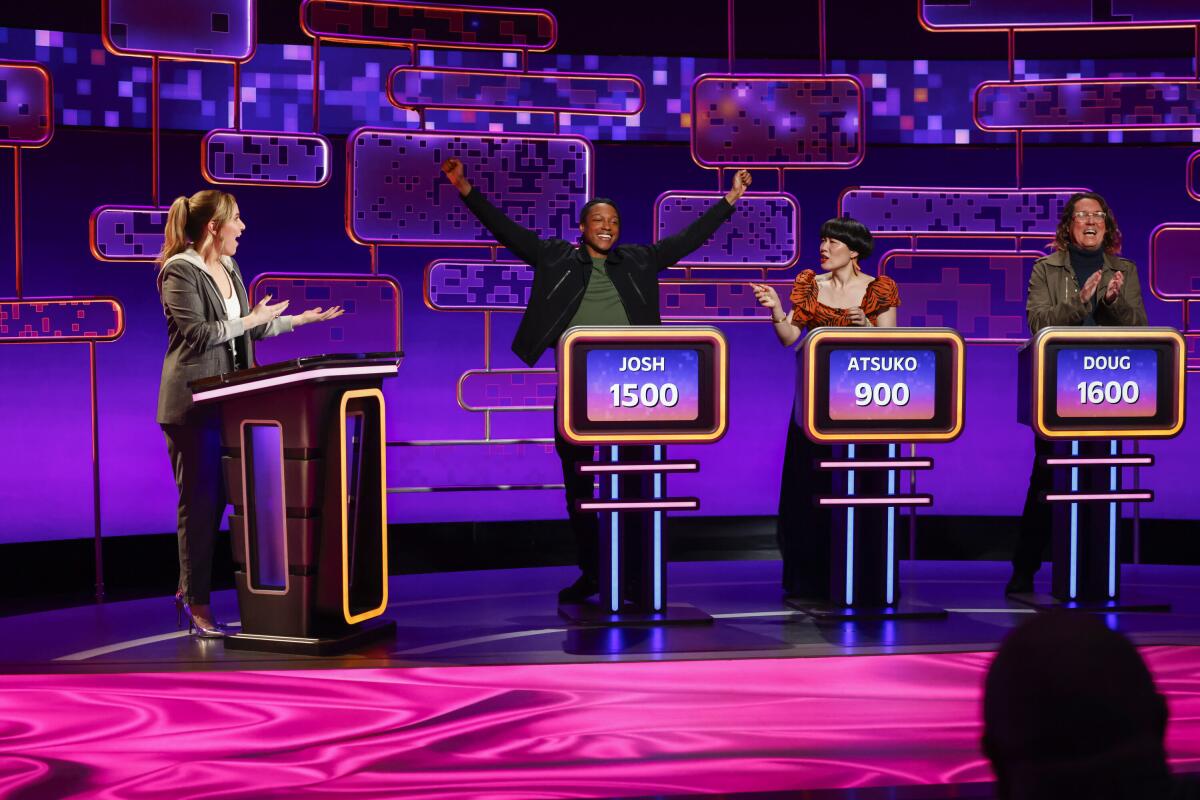
When you took this job, to what extent did you think about the history of women in late night, and the fact that you’d be the only on-air female late-night host? No pressure or anything, right?
I always feel a lot of pressure about everything. I feel that about my stand-up career, too. The answer is, “yes” and “always, with every situation.” I think I am just trying to be present and do the best job I can and enjoy it for however long I am allowed to do it. Because it is so fun.
So much in this business is not under your control. If you want to have a long career and not lose your mind, you have to acknowledge that. There are so many things at play. Getting anything on the air is a miracle. If you’re fortunate enough to get a show, or even sell a script or whatever, you really do just have to enjoy it. Because you don’t have much control. You just have to enjoy the ride.
Your career and visibility have increased rapidly between your first Netflix special, “Quarter-Life Crisis” (2020) and third, “Have It All.” How do you think about the evolution of your stand-up in that time? Have you had a chance to stop and reflect with things moving so quickly?
I’ve certainly gotten more confident. Your material probably changes a bit once people are coming to see you. “Quarter-Life” was written in clubs where nobody knew who I was. I had to try and kill at 10 p.m. in Kansas City, or whatever — cities where young people go to a comedy club because it’s one of the fun things to do. “Oh, yeah, we’ll take a chance on this person because we liked their five-minute clip from ‘Conan,’ but we don’t know anything else about her.” You were still proving yourself every night. It was not like it is now. It is so much more fun to perform for people who paid money to see you, specifically. As a result, I think you’re given more grace, and you’re allowed to try stuff that maybe you wouldn’t have felt like you had the time and space to figure out, because it wasn’t killing immediately. You can get more personal and specific. Maybe not go as broad as you had to when everybody was like, “Who the f— is this?”
It’s a very different thing — with this last special, to toe that line of being self-deprecating but also acknowledging the fact that things are going pretty good now. I want to acknowledge that and be appreciative and grateful and not act like my life is the same, or my life is really hard. I think that was the biggest shift for me: going from “Hey, it’s me, all this introductory stuff” to “Oh, now how do I talk to people?” Not that everyone who watches [“Have It All”] is going to know who I am. But a lot of people already have some context for me.
Also, I felt like “Look at You,” which I’m really proud of, was more specific to me. And I think “Have It All” is more similar to “Quarter-Life.” I think it’s the type of hour that you can watch if you don’t know anything about me, and it might turn you on to my stuff. “Look at You” felt very personal and maybe like it would help to know who I was beforehand. I wanted this one to be broader, more fun, and lighter. My next hour, I’ll probably go personal and specific again. Not that “Have It All” isn’t personal and specific. It is. It’s just not as dark.
In a recent New York Times profile, you mentioned that you’ve set new boundaries around what you will discuss publicly — your relationship with your father, for example. Was there a moment you can pinpoint where you realized the necessity of drawing boundaries?
It’s just realizing that people interviewing you are doing a job. They’re not necessarily your friend. They’re not gonna be like, “Oh, yeah, I won’t include that if you don’t want me to.” There’s been a lot of times that I was like, “Oh, I didn’t need to say that. There’s no “just between us.”
You can always say “off the record.”
No, I know. But I can’t retroactively [say it]. I’ve certainly gotten better at that. There have been pieces where I talked about something for two minutes in an hour-long conversation, and that’s what the whole piece is about. I thought I would say something quickly to get out of this question, and that became the whole piece. And [the journalist] called other people to ask them about XYZ. So, you have to be a little more guarded. With stand-up, I think I’ve done a pretty good job. I haven’t put anything in a special where I was like, “God, I shouldn’t have said that.” If I’m gonna try out something personal where I’m not sure how I feel about it, there’s no other way but to do it live, unfortunately. It’s learning how big a stage am I going to put certain things on? What needs to be worked out in a small room in L.A., where there’s only 40 people, and you can see how it feels?
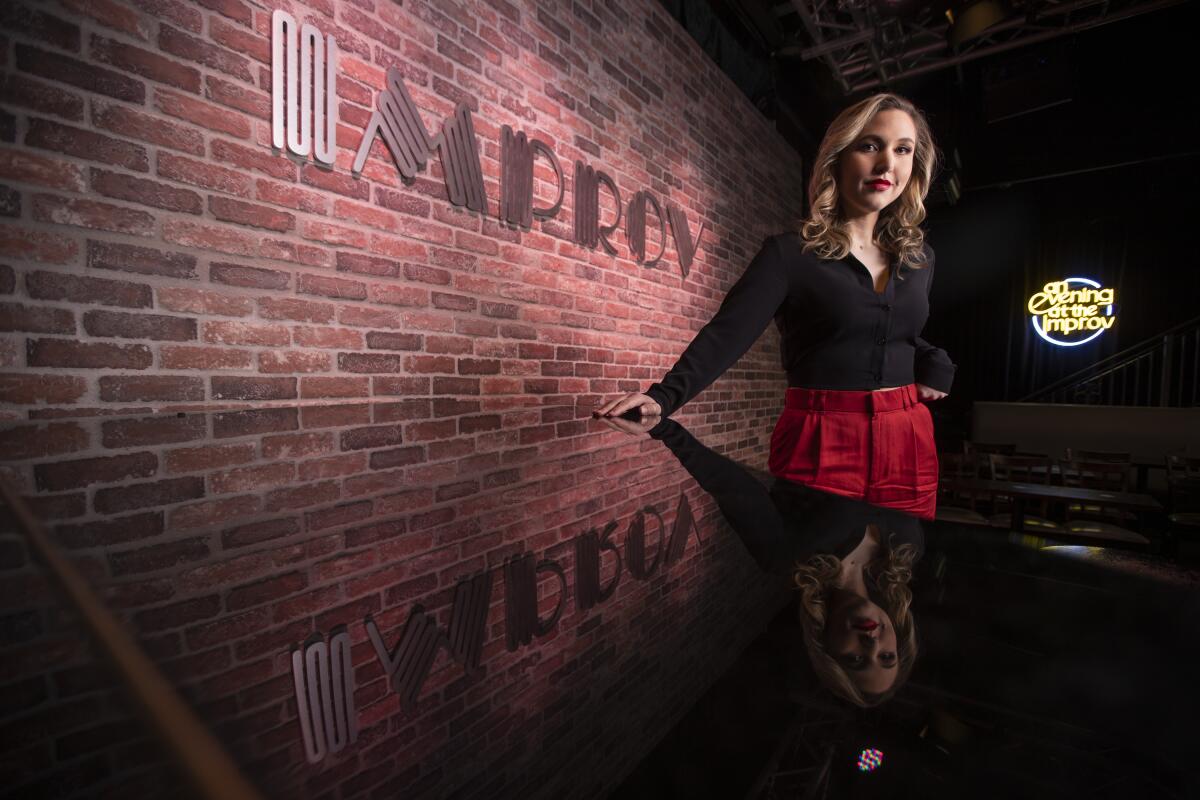
You spent the “Have It All” tour asking the audience for weird sleep advice. What’s some of the best or weirdest you’ve received?
People yell out a lot of medications. Put onions in your socks. Take a cabbage water bath. Magnesium — I started taking magnesium, which I know is super basic.
The title “Have It All” both lampoons that very notion while asking a legitimate question about whether you, Taylor Tomlinson, can have this level of success while figuring out a mental-health balance, plus a healthy relationship. In all seriousness, what does having it all mean to you these days?
It really depends on the day. I think when it comes to love and a career, the idea of “you can have it all” is a phrase as old as time. There’s a line in “Sex and the City” — you know [Carrie Bradshaw’s] boss at Vogue? Enid?
Candice Bergen as Vogue editor Enid, yeah.
I think she said, “Having it all is realizing that your life isn’t going to look the way you thought it would.” In the scene, it’s a little depressing because she’s in a romantic situation she does want to be in… I think that’s kind of beautiful and true. We all have this idea of what our lives are gonna look like when we’re [young]. When I was 12, I was like, “By 30, these are the things that are going to happen.” And in some ways, my life is so much bigger and better than I thought it was going to be. Then, in some ways, certain things haven’t panned out the way I hoped they would. I think everyone can relate to that. Once you get the things you want, you realize, nothing’s gonna fix you. There’s nothing you can achieve that is going to fulfill you, complete you, make you everything you want to be, and perfectly happy and content forever. There just isn’t. I think to me, having it all is just appreciating what you have where you’re at. Trying to get better and grow every day, and really enjoying the process of whatever it is —whether it’s finding love or the career of your dreams.
More to Read
The biggest entertainment stories
Get our big stories about Hollywood, film, television, music, arts, culture and more right in your inbox as soon as they publish.
You may occasionally receive promotional content from the Los Angeles Times.
